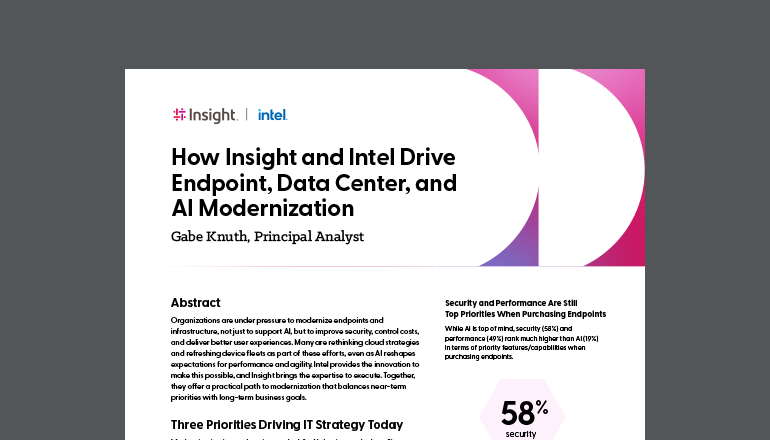Article Benefits of Outsourcing IT to a Managed Services Provider
The advent of the internet and cloud-based services mean businesses now have to grapple with a ton of additional supporting functions. These include, but are not limited to, cybersecurity, cloud hosting, printing, device management, remote support, disaster recovery, and support desks.
By Insight Editor / 19 Mar 2019 / Topics: Cloud

It’s normal for executives to feel overwhelmed. Is the IT department up to the task? Will the time and effort needed to handle these units distract me from my core deliverables?
As business needs scale up, that’s when you can start to think about outsourcing your IT department.
The benefits of IT support center on the fact that it equips businesses to remain at the forefront of technology, while still focusing most of their resources on their core goals.
The average budgetary amount dedicated to outsourcing information technology has remained at 10.2% since 2014, according to a study by Computer Economics, with businesses of all sizes preferring to seek IT support services for application hosting.
Due to high-cost savings and access to highly trained IT staff, 53% of respondents to a Deloitte survey say they are currently outsourcing some or all of their IT functions.
Of those who are not currently outsourcing, 26% say that they will do so in the near term.
Benefits of Outsourcing IT
The main benefits of outsourcing IT are a reduction in both operating and capital expenses. By working with an MSP, you are not responsible for hiring, training, and retaining skilled IT professionals.
You don’t need to worry about expensive capital expenditure for new servers, nor are you directly responsible for securing data, keeping networks running, and other issues.
With just a manageable per-user or per-period operational expense, all of your IT needs are handled by the MSP. This frees you to dedicate most of your resources and time to your core business activities.
1. Costs
The financial benefits of managed services include leaner staffing costs associated with hiring, training, insurance, and contributing to retirement plans.
Outsourcing your IT support to a reputable company means that they are the ones responsible for the hiring and managing of employees, reducing your time spent on the hiring process.
Also, when you outsource your IT, you’re hiring not just one employee, but taking advantage of the expertise of many. Working with a team of IT staff is a great way to acquire a wide-ranging knowledge base.
Furthermore, the team will have great insight into ways that you can save money by adopting certain IT strategies that they have seen work with other clients.
You can also take advantage of vendor relationships that have already been formed by the IT firm. They’ve spent their time understanding the best technologies for their clients and aligning themselves with top-of-the-line vendors to ensure that you’re getting the best equipment. Another advantage of managed services is in lower overhead costs associated with bulk purchasing of hardware and software licenses.
Outsourcing certain tasks, such as hosting data using public, private or hybrid cloud providers, also helps with reducing cost.
By using a cloud hosting provider, you won’t need to worry about the extensive hardware procurement and maintenance costs linked to on-premise hosting.
Instead, you can convert hefty capital expenditure (CAPEX) costs into operational costs (OPEX) that are scalable and easier to manage. In other words, you can control your expenditure by only paying for what you need instead of getting stuck with expensive but underused servers.
2. Trained IT Staff
Another benefit of outsourcing IT is having a team of skilled IT practitioners without spending the time and resources to hire them outright.
Since it’s their core competency, IT support companies hold the responsibility for hiring staff with specific qualifications and certifications. These professionals are constantly learning and training as new technologies emerge with opportunities for further development.
As industry specialists, managed service providers know what it takes to make a successful team and can assist in succession planning, hiring practices, and resource planning for the future.
Whatever your needs, outsourcing IT functions is a great way to take advantage of knowledge unavailable to your team, or to free them up to work on other projects.
3. Free Internal Resources to Focus on Your Core Business
If your IT team is focusing on the day-to-day maintenance of your servers, the health of your computers, or data backups, they may be wasting valuable time that could be devoted to implementing new technologies.
According to recent studies, 31% of companies who are outsourcing tech support do so to free up internal resources.
Once your IT team is available to tackle projects centered around strategic business goals, you’ll see a drastic increase in actual IT productivity.
This includes projects such as creating applications, establishing new business processes, strategizing ways to incorporate innovative technology into your business, or improving customer satisfaction.
According to Statistic Brain, 28% of companies who outsourced IT found that they were better able to focus on their core business goals.
An effective IT team isn’t reactionary in their dealings with your business technology; they’re proactive in their quest to consistently better processes to boost your business productivity.
4. Full Compliance & Security
Simply staying on top of compliance regulations established to protect client data, credit card numbers, or any other sensitive information can be a time-consuming task.
PCI Compliance Standards have outlined a number of regulations that stipulate what companies must do to stay on top of sensitive information.
Ensuring that your firewall is up-to-date and there are regularly scheduled workstation and server audits are important to meeting compliance standards.
Software systems also require constant monitoring to ensure that your licenses are up-to-date and that your users comply with the software guidelines.
Compliance Support
The benefits of outsourcing IT include compliance support staff, who manage and monitor software licenses in order to help you fully understand the timelines and guidelines stipulated in the agreements.
These experts can also aid in the roadmapping of this software so you can better plan for a future end-of-life or future updates.
Establishing and maintaining security protocols on all your systems — from workstations to mobile devices to servers — protects your sensitive data from internet threats, such as hacks or other security breaches.
There are a number of different methods for securing your systems, and IT support companies have a solid understanding of which would be best suited to your unique needs. Furthermore, outsourcing your IT means that these systems are monitored 24/7/365 — which means they can address and fix disruptions promptly, at any time.
5. Take Advantage of Higher Tech Capabilities
According to recent research, 34% of companies use outsourcing to gain access to IT resources unavailable internally.
That’s a major benefit of IT support.
This could be relevant for a number of time-sensitive projects and new technologies that your current IT team can’t handle, or because business is expanding quicker than your current IT team can manage.
When you outsource your computer support, you’re taking advantage of the experience of many as opposed to hiring one person. The combined knowledge of an entire team of IT techs provides a support system for whatever may arise.
With the collective experience of a team of IT professionals, outsourcing your IT support is a greater return on investment than having an extra body in the office.
Full vendor support is something that can take a small business, or even an enterprise business, years to develop. A managed services company who already has those relationships formed understands the nuances of the programs, and they often get special pricing as a value-added-reseller.
6. Strategic Consulting
The benefit of working with a company whose core competency is IT services is that they’ll have a solid knowledge base of things that have worked for other clients and a knowledge of things that haven’t worked.
If your IT team is looking to strategize the future adoption of new technologies, then having an IT services firm in your corner is a great advantage.
Strategic software and hardware decision-making should always lay in the hands of qualified, technically-minded teams. At Insight, our trained technicians are on your team when it comes to providing strategic guidance, management of IT services, and per-project consultancy.
If you’re looking for a completely turnkey solution, or have been looking for ways to free up your IT team’s resources, we can help you establish what’s right for you.
How to Know When It’s Time to Outsource IT
A growing business is a healthy one, but with growth comes the need for change.
Things you were able to get away with as a younger, smaller enterprise are no longer viable once you hit certain thresholds. As such, you need to be willing to adapt to your company’s new size. The same goes for IT.
Where one or two workers were able to handle the load before, that small team may feel overmatched as your company increases in size.
Managed IT services can be the answer, allowing you to scale up without having to worry about your IT department being underserved.
A growing business may find itself with a target on its back for massive hacking attacks. As such, a comprehensive cybersecurity plan with a disaster recovery scheme and a well-organized IT frontline can make all the difference between a crippling hack and one that is merely irksome.
Here are some specific ways you can tell that it’s time to outsource IT:
Bloated IT Spending
If the IT budget of your company is constantly running over or continues to balloon at an alarming rate, there are two common reasons: one is that you are simply not allocating enough money for IT, and the other is that you are in need of a bigger and more efficient team than the one you have now.
As time goes on and demands grow, the IT department will naturally need a resource injection to keep up. In-house IT experts can be, and many times are, great tools to have, but they need help. You’ll often see that need reflected in the budget.
You could hire more on-site IT help, which has its own benefits, but this can increase costs, as good IT help does not come cheap.
Alternatively, you can hire a team that will work on a la carte payment model, as opposed to bringing in a full-time IT worker who might sit around unoccupied for long periods of time.
By employing the help of managed IT services, you can save money while increasing the capacity of your IT department, which is a major win-win.
Technical Issues Mount
A well-trained IT expert should be able to handle many issues that your company might face. However, they are still just a single person doing what can be a highly demanding job.
No matter how good they are, there are limits to just how much they can accomplish. And that’s where IT managed services come in handy.
Most days of the year, your company may not need the extra muscle. But let’s say that you encounter a sudden data breach or another calamitous IT problem.
In that situation, your experts could easily find themselves in need of serious backup. IT managed services provide that backup so when heavy, time-draining issues arise, you’ll have the necessary resources lined up to nip the issue in the bud.
The Need For IT Speed
Another added benefit of IT managed services is that solutions will come in at a speedier rate, compared to a smaller IT team on-site.
An MSP can allocate the appropriate amount of resources to your business depending on the job, whereas your on-site capacity is limited to the amount of employees you have working in that part of your company.
By outsourcing, you gain access to a team of experts that can assess your situation and provide your business with the appropriate number of IT experts and scale up or down accordingly.
With that model, they can effectively complete most IT issues at a faster rate than the alternative.






